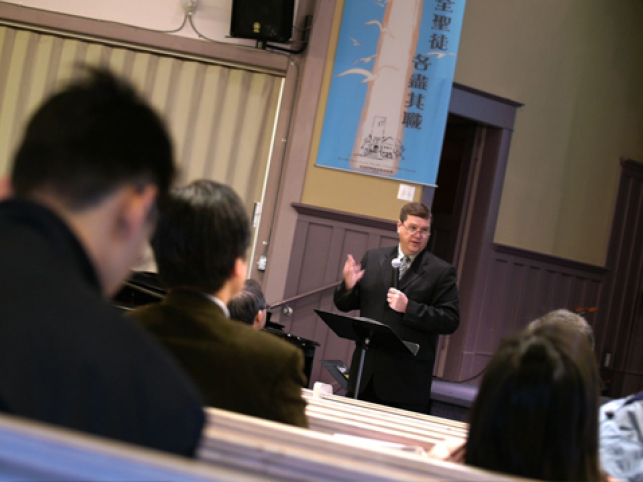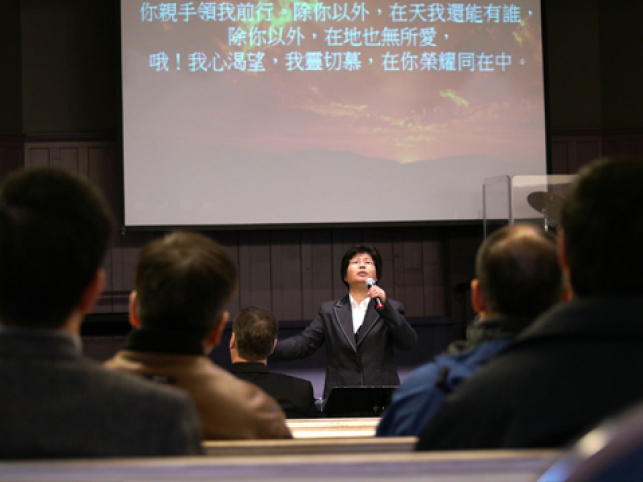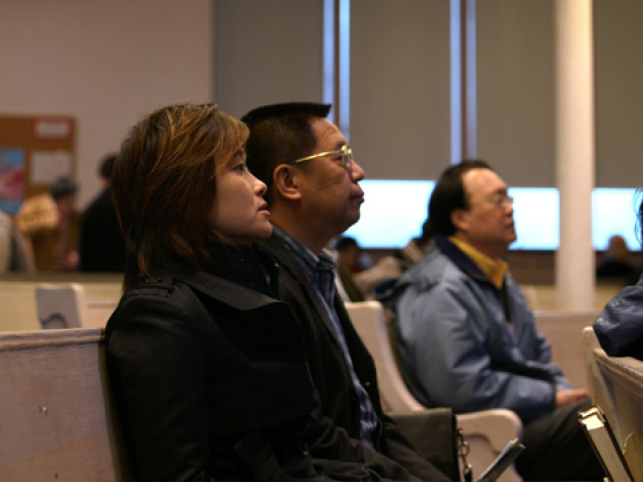[Vancouver, Canada] The president of the Evangelical Fellowship of Canada was recently invited by Chinese Evangelicals in the greater Vancouver area to share his viewpoints on the separation between church and state.
At the monthly meeting of the Vancouver Chinese Evangelical Ministerial Fellowship, held Monday at South Vancouver Pacific Grace MB Church, Mr. Bruce Clemenger defined the roles of the church and state and shared how evangelicals can work with public-elected officials to achieve their objective to foster and promote society norms and principles from the Bible that contribute to the public good.
Mr. Clemenger explained that although Canada was a part of the British commonwealth, it does not have the state church as Britain does nor does it have a complete separation between church and state as does the United States. Furthermore, up until the 1960s Canada was a Christian pluralist nation until a rapid time of secularization. Still, Canada’s constitution does not have a formal separation between church and state.
Furthermore, Mr. Clemenger pointed out that because when Canada was founded the majority of the Canadian population was either Catholic or Protestant, the Canadian constitution allows for provision for minority religious instruction, so government-funded Catholic schools can be found in Ontario. State support for religious education is illegal in the United States. Also, there is no constitutional barrier in Canada that prohibits government funding from being given to faith based organizations and some of the beneficiaries of such provision in Canada include World vision and Salvation Army.
Mr. Clemenger said that even now the Ontario legislature still recites the Lord’s Prayer each day, which shows Canada’s history of religious freedom in the public expression of faith.
Although Canadian government may fund faith-based organizations and allow for public expression of faith, it remains a nation of concern; many of the social norms that have shaped the country are being questioned with an example being the legalization of same-sex marriage nationwide under the Civil Marriage Act approved in July 2005.
Following the inclusion in the constitution of the Charter of Rights and Freedoms in 1982, the Supreme Court has ruled that Canada cannot make a law based upon any particular religious doctrine. In the case of Canada Revenue Agency, the church’s role is defined to solely advance religion and churches must not engage in partisan political activity, the EFC president remarked.
While defining the scope of the Charter as limiting government intervention, ensuring freedom of religion and providing reasonable accommodations to equality rights, Mr. Clemenger said that there are “disagreements in Canada on the extent to which the government can interfere in various spheres of life like the family, business, education and religion. Evangelicals also often differ on what the government should or should not do in a variety of areas of social concern. For example, evangelicals are concerned about poverty and churches are involved in the relief of poverty, but evangelicals are not always in agreement about what the government should do about poverty.
Introducing the roles of church in politics, Mr. Clemenger said that the church serves both as a prophet and a participant. “Church should speak into politics rather than becoming a partisan.”
“Church and State are two separate institutions with different responsibilities. A local church is a religious institution and in its structure is somewhat similar to other religious institutions like a mosque or a Jewish synagogue. They will each have boards and have religious purposes that will qualify them for charitable registration. They will also all have a spiritual direction. Christian church is animated by the spirit of God and will serve the Gospel and that is different from what animates a Temple or a mosque,” Mr. Clemenger explained. “Legally the structure is somewhat the same, but the spiritual direction is different.”
Likewise, said Mr. Clemenger said all States have some kind of political creed that gives it direction and that helps it decide on what it should do and should not do.
“Even though Canada adopted the Charter 1982, in many ways it has yet to define its political creed. The Charter refers to the ‘principles of fundamental justice’ but it does not define what those principles are and many Canadians still disagree about what are the societal norms that should shape us as a nation.”
“In both faith and politics, everyone is a believer. While a politician’s actions are animated by his particular worldview, Christians follow the examples of biblical figures such as Joseph and Daniel, who were politicians of their time, Jeremiah, who was a prophet, and Esther and Nathan, who were participants.”
“The ways of individual Christian participation in politics can be individual participation, involvement in political organizations, and in political parties. Evangelicals can do a number of things. The church’s role is different from that of individual Canadians; Church can serve as a prophet and as a non-partisan participant,” Mr. Clemenger stated. “As a prophet, pastors can often times be found rallying against a trend in society and offering an alternative way of life. As a participant the church can be a positive contributor to the public good through a variety of programs.” Churches have much to offer their communities.
Mr. Clemenger said that the church can be prophetic by modeling a certain way of life. “Our life should be different in how we resolve conflicts, our family and marriages should be different. We are all sinners and broken people who have found new life in Christ Jesus. As Jesus did, we minister into a broken world I think that is what speaks the loudest. We can speak about the nature of covenant marriage between a man and a woman. Yet in many churches today, there are numerous broken marriages. We must minister inside the church as we also ministry to our neighbours and communities. The secular world presumes the Gospel is limited to the private and inward parts of life. That is not what Jesus taught. We should resist that which narrows the effectiveness or the scope of the Gospel.”
“Twenty years ago, most university students would have attended Sunday school, but it is quite the contrary now in today’s generation. Therefore, instead of treating the present generation as backslidden, we should treat them as lost.” We must learn to engage in the pubic square differently.
“In serving as participants, churches should follow these themes: upholding the sanctity of life, caring for the vulnerable, pursuing justice, and stewarding freedom,” stated Mr. Clemenger. “Our affirmation of the sanctity of human life is rooted in our belief that we are created in the image of God and our dignity cannot be taken away.” Jesus’ example of caring for vulnerable as an expression of God’s love for all prompts us to ask ourselves if we have been our brother’s keepers and are we taking care of our brothers and sisters who are broken in their lives?”
In the area of elections, Mr. Clemenger recommended that the church participate by applying biblical principles to important social issues, hosting an all candidate meeting, and providing information on issues of concern flowing from biblical teaching as long as not linked to any party or candidates.
Furthermore, public accessible arguments should be provided when dealing with elected officials.
“What specific societal norms are you trying to foster and promote?” asked Mr. Clemenger.
From his experience of working on the issues of rising the legal age of sex consent, same-sex marriage, religious freedom and upholding laws against euthanasia, Mr. Clemenger explained that often time politicians may agree with you in principle of an issue but disagree on the strategy. He has worked with a politician, who agrees with him in principle that prostitution is morally wrong but approves of Red Light Districts.
Mr. Clemenger reminded the Chinese Evangelicals that politicians are in public service because they care about their community, province, and nation, so it is important to find the common ground and ways that you can serve them. Since most politicians are people of action, it is important to be specific in the requests presented.
When speaking of policies, Mr. Clemenger urged the attendees to first understanding what the government can do and cannot do. This will avoid asking them something that they cannot fulfill.
Then, when speaking with policy-makers, Mr. Clemenger pointed out the importance of researching the framework of the current policy, directly meeting the decision-makers, finding out the reasons for policy change or maintenance, providing public accessible reasons for sustaining or changing policy, and mobilizing accordingly.
As a rule of thumb, when speaking to a public-official, it is important to use “public square” language that is derived from the best interest of the society and avoiding using religious language, be well-informed, and call on them to follow policies and commitments they have already made, reminded the EFC president.
Finally, Mr. Clemenger concluded his speech with Mark 12:17, which he interpreted saying that the authority that the State has is given by God and that Christians should respect that and live lives that follows the biblical principles.
“Although we will often be portrayed negatively for standing against many social trends, our message is a positive one; we are good news people who seek to address the brokenness of people and communities in the name of Jesus,” He said.
*Evangelical Fellowship of Canada consists of 40 denominations and congregational associations, 85 ministry organizations, 35 Bible Colleges, Liberal Arts Colleges and Seminaries, over 1,000 congregations, and is a member of the World Evangelical Alliance. EFC hosted a pre-screening of the movie “Amazing Grace”, which portrayed the fight of a British politician to end the slave trade in Great Britain through politics, at downtown Ottawa theatre and invited MPs, Senators, Ambassadors and their staff. 280 attended.










